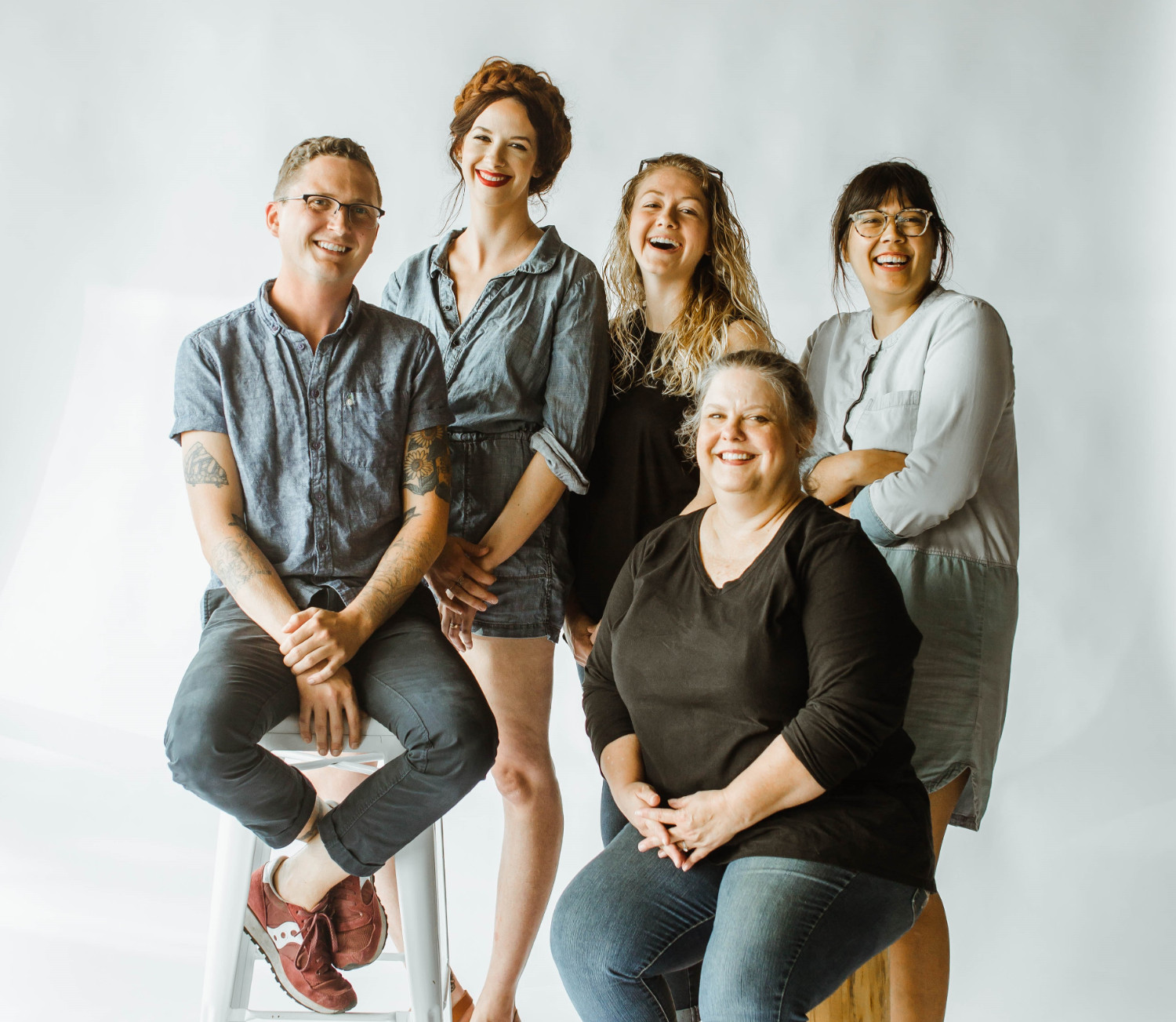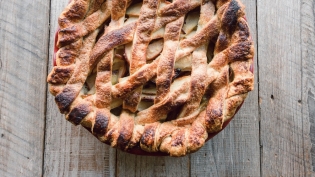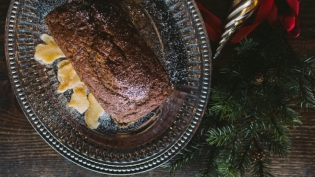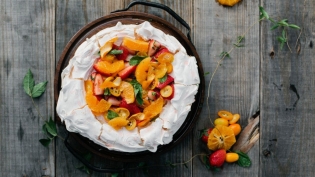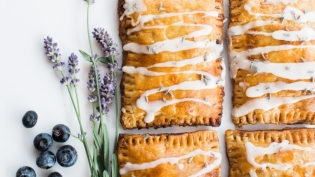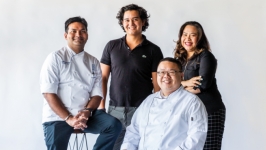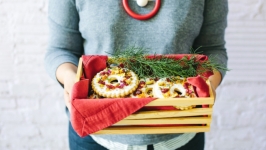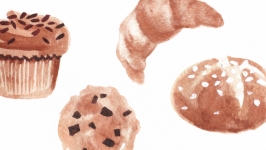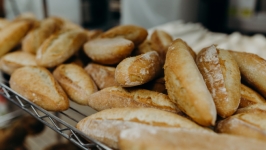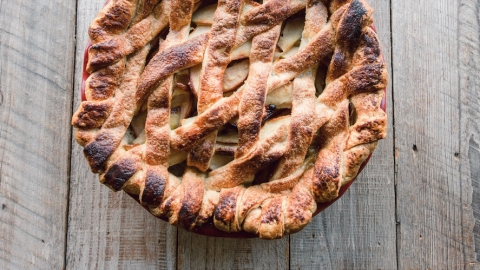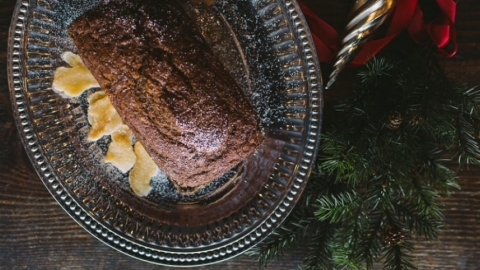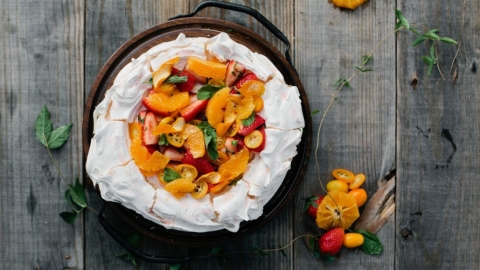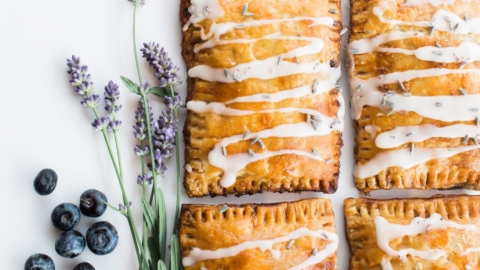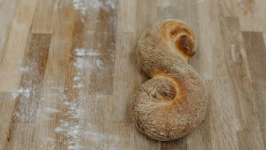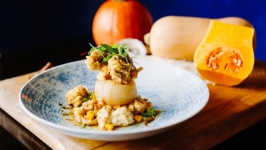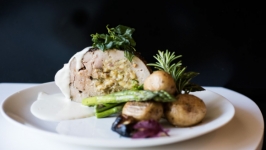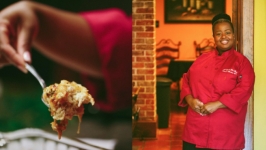Chef's Round Table: Artisan Bakers at Coffee Shops
Chef's Round Table is a back-of-the-house conversation series where we sit down with local chefs to get an inside look at the questions and conversations taking place in kitchens throughout Northeast Florida. Chefs change with each new round table, as do topics discussed. For the Artisan Issue, we caught up with the following chefs:
Adam Burnett, Bold Bean Coffee Roasters
Robynn Jackson, Vagabond Coffee
Ariel LaMontagne, Kookaburra Coffee
Calli Marie, BREW Five Points
Kelly Weaver, Spring Park Coffee
EDITOR’S NOTE:
Chefs for this issue were invited to participate based on the following criteria: participants are chefs and/or bakers at local coffee shops serving pastries or other baked goods, who are actively involved in menu development and sourcing for their shops. Criteria will change with each issue and chefs invited to participate will vary. Want to be included in the next discussion or have a chef you'd love to see featured? Drop us a line at editor@edibleneflorida.com.
***********
How has consumer demand and interest in coffee shop baked goods changed since you started?
CALLI: I think 4 or 5 years ago, bigger was better. And gluten or dairy free wasn’t as big a deal as it is now. That’s something that has shifted a lot since I started 4 years ago, being aware of people’s allergies and baking toward that (or not). It didn’t seem like people cared as much, or it wasn’t so prominent in requests.
ARIEL: A big change I’ve seen is supporting local businesses. Working in a coffee shop has made me more aware of how much people want to buy local goods, and not go to Starbucks or Dunkin Donuts.
ADAM: Along that same line, people want us to use local produce and other products in what we serve. That’s come a long way in the past 5 years.
CALLI: People are more intentional about their purchases, even if it is coffee or baked goods.
ROBYNN: I’ve seen that people also look for things that remind them of when they were young, they are nostalgic. If we can make something that is similar to what they grew up with, and revamp it, that is something they can relate to who they are today.
KELLY: Our customers are also more educated as a result of watching Food Network and Cooking Channel, and they are more apt to experiment with a different ingredient, rather than just a plain old chocolate chip cookie.
How do you incorporate seasonal and local products into what you are baking?
ADAM: It’s really good working with local distributors like Blue Buddha and asking what local produce they have. Usually it is stuff like strawberries, blueberries or other seasonal fruit that can be easily switched out in items like muffins. There’s always going to be a demand for muffins, but with the changing seasons you can adjust to ingredients that are only available at that time of year. So, we can keep a popular item but switch it up a bit.
ROBYNN: We’ve partnered with Urban Canning Co. out of St. Pete and they use local products in their jams and preserves. I like putting them in pop tarts or cookies. My baking space is so small I have to shop weekly. I’ll go to the market and get produce from local farms. I don’t have a lot of storage space, so I can only buy what I need for that week.
ARIEL: We also work with local distributors in trying to buy as much local as possible – we get fruits and vegetables seasonally to use in our pies and other baked goods. We get meat from local farms and the sausage in our pies is also made locally. For dairy, we buy from Wainwright, which I think a lot of other businesses here also use. We try to support other small businesses in the area as much as possible.
CALLI: We order from Frog Song out of Gainesville and they send a list of what they have that week, which can be a small list depending on the season. While they may have a limited selection, we know it is fresh, probably picked the day we order it in some cases, and they may have some produce that we can’t get anywhere else. Another local purveyor, Mike Stowers at Saturiwa, always has really interesting ingredients. From week to week he may offer different items based on what’s growing at the time. One week he may have blackberries, but the next week he has figs, which is nice. I like that, being forced to use stuff and change up our baked goods.
KELLY: I also have a very tiny workspace so I have to shop weekly as well, and be willing to be flexible. If you have your heart set on strawberry something and then the berries look bad, you have to figure out what you can do instead. Like Adam said, you can do something popular and switch out an ingredient, like peaches instead of strawberries.
Most of you work in very small kitchen spaces, almost as an add-on to the operation. How does the limited work space impact your approach to baking?
ROBYNN: Everything is super fresh, because I can’t store anything. I share refrigerator space with the baristas, so I can’t go out and buy a ton of strawberries or anything. If I run out of some kind of produce during the week I will go buy it, or change what I was going to make based on what I have on hand.
ADAM: Well, my space is not so tiny anymore, but when we first started we had a little galley kitchen and a countertop fridge. I’m lucky enough to have a walk-in freezer now, but even in a larger cooking space, since we’re baking for three Bold Bean shops and a coffee shop in Fruit Cove, we go through all the produce and dairy in a week. As far as how the kitchen works in general, when we moved from a small space to a larger kitchen we went through this challenge of things taking so much longer to do. You hear efficiency experts say think about the number of steps it takes to do anything. Steps really do matter, when you’re walking 30 feet instead of just turning around and grabbing what you need from the fridge. So we really had to work with the layout of the space to make things as easy as possible. It’s nice to have extra space, but at first it added lots of time to our tasks and we had to work that out.
ARIEL: Prior to starting at Kookaburra, I worked in a small kitchen, and it was also a challenge for me to be able to cook in a larger space. Also, since the baked goods were not made in-house previously, I had the chance to figure out the menu, come up with the recipes, order all the ingredients and organize the space. We have a large walk-in, which is nice and allows me to order on a weekly basis. We also just started baking at our location on the beach, which has a super tiny space that we share with the baristas. It has a window where customers can walk up and order coffee so we are constantly asked questions about what we are making, the ingredients and other things.
CALLI: We have a lot of shelves in our teeny kitchen, with one prep table. It doesn’t really affect what I bake, I just make the space work. One fridge is completely stocked with milk, so if there is a recipe I want to make, a dough that needs to rest overnight in the fridge, I can’t do that. I can’t make two days’ worth of baking and stick it in the fridge. There is someone baking every day, because there is nowhere to put it. So you make it work – a lot of stacking.
KELLY: I also have a tiny space and share a fridge with baristas and breakfast cooks. I can’t prep anything more than a day or two in advance. I don’t even have a stove. I have a little Coleman burner – it’s sad. But you just figure out the best way to make it work.
Let’s talk a little bit about recipe development and the process you go through when creating a product, and where you find baking inspiration.
ADAM: When we create recipes, we think "oh that would go well with a certain roast or a certain bean." But there are other items we make that are fine just on their own. Nowadays when people go to a coffee shop they expect to see a selection of baked goods and when the products are not there they get upset. People are going for both, not just for coffee anymore.
CALLI: We’ll consult with the baristas if there’s a special thing, a specific coffee we are getting in that’s super special. We’ve had pairings before as an event.
KELLY: For inspiration, I steal from everywhere – I’m a shameless hack! If there’s a cocktail or ice cream recipe, I use that as a starting point and figure out how I can recreate it as a baked good.
ADAM: Anytime I go on a trip or on vacation, I spend the entire time eating baked goods. I was just in the Bay area and I can’t tell you how many croissants I ate. I call it "market research," and observe what they are doing with croissants in other places. What are these cities that are known for their food doing that I could apply here? I’ll taste something amazing and want to recreate it with the produce we have here.
CALLI: For cakes, I get inspiration from flowers at the market, or a painting or all these other cake people who make cakes way prettier than mine. I get inspiration from my peers and others I look up to, especially on Instagram. As far as BREW’s pastries, sometimes it’s easy to get stuck making the same stuff all the time. Lately I have been thinking I want to do something different but I haven’t settled yet on what that is.
ROBYNN: Just getting out of town is inspiring. We were in Paris for 10 days and everything was perfection at the pastry shops. When I got back I felt like a new person and wanted to do all these new products. Sometimes it feels like Jacksonville is kind of like a black hole, where we all get stuck in our routines. Just to get out and see what other people do is beneficial.
ARIEL: For our pies at the Kookaburra, a lot of the inspiration came from the owner’s mom, who is Australian. When I started I played around with them quite a bit, but she came and made sure they were still okay. For other baked goods I get a lot of inspiration from my team and let them play around with recipes and different flavors that they like, so it is not just me developing all the recipes. I like them to also feel good about everything we make and that they have a sense of shared responsibility. Also with our breakfast pies, I like to listen to what our customers want and their suggestions on different ingredients.
What impact has social media had on your work? Has it influenced what you bake?
ADAM: One thing it has done, and impacts what we do, is that it provides exposure to a lot more businesses out there. We’ll have customers come in and tell us how they have seen a product on someone’s Instagram feed and ask if we have done something like that – they would love to try that kind of a baked good. People are more knowledgeable about all the pastries out there and want to be able to get them locally.
CALLI: I think we are a lot busier because of social media. People will see a cupcake or pop tart and specifically go to that coffee shop that morning to get that product. Before, your coffee shop was the one by your house and that’s where you went. But now it seems like people will venture out more to have that whole experience because they saw it on social media. The cake side of my business is pretty much due to Instagram.
ROBYNN: It’s also a way to get feedback and opinions, which can be a good thing. For instance you find out that everyone loved this certain flavor when people comment on it. Or if you post a picture and get so many likes on it, then you think, oh I can make this again next week because everyone was freaking out about it on Instagram.
KELLY: Or you wonder why something didn’t get a good response on social media, or why people didn’t like one product or another. What was wrong with that? Sometimes if you follow other people, you get discouraged and think why can’t I be as good as that?
ARIEL: We definitely see the effect social media has on the demand for our pies. They sell out so quickly, and we can only make so many in a day. People see on Instagram that we have certain items and when they come in and we are sold out they get annoyed. They expect to get one freshly baked when they come into the shop.
How do you feel about the hours you typically keep as a baker?
ARIEL: I’ve gotten used to it over the years, though some people think I’m crazy – I get about 3 hours of sleep and they ask if I really want to do that for the rest of my life! But I love what I do! Since I live in Jax and commute to St. Augustine, I get up about 1:30 every morning. It takes some adjusting to waking up that early, but if you love what you do, you do whatever it takes.
ADAM: I don’t have the early mornings anymore, as I’m not in the kitchen as much as I used to be. For a while though I would do the overnight shift, 9 PM to early morning and that wasn’t too bad.
CALLI: I don’t work overnight, that’s not happening. We can bake in the late afternoon/evening for the following day. We warm all of our products up so it works for us to make the day before. We have it set up with product selection so that someone doesn’t need to be there at 2 AM.
ROBYNN: I get in at 5 AM. I feel like I have been doing it for so long, if I didn’t work these hours, then that would take some adjustment. I’m used to finishing at 2 in the afternoon.
KELLY: I start at 7 AM every day, but at my previous baking job I got up at 3:15 and had to be there at 4 AM. This is so easy, I don’t have to be there super early. Before, my entire family had to adjust to my hours because I had to go to bed so early.
How do you feel about the role you have played in cultivating a coffee shop culture and creating a sense of community?
ROBYNN: I remember when I moved back here in 2011 from Kansas City. That place definitely had a bigger coffee culture than Jacksonville. Bold Bean was the first coffee shop I went to here and I thought, "okay we’re getting somewhere." I started baking with Adam – I fell in love with Bold Bean and loved helping him create that. He really just paved the way for all of us to have great baked goods in Jax. That’s pretty much where it started, and I feel so honored that I could help Adam. It was a great time.
ADAM: I think it’s really awesome to see how much the scene has advanced over the years – there’s so many coffee shops now I can’t even name all of them. It seems like there’s a new one opening every couple of months. And they have amazing baked goods! That makes me so happy to see that. It makes a city really interesting.
KELLY: I love making people happy and I love when someone says "I was thinking about this tiramisu all day long and I am so glad you have it today." If I know a particular customer is coming in, I’ll have something made that they like. We’re a small place so I learn what certain customers go for. I’ll see the scone lady or the chocolate chip cookie guy – it’s nice to be able to have that kind of relationship and closeness with people.
ARIEL: Well I don’t drink coffee, I’m a tea drinker, and everybody at work thinks I’m crazy because I get up so early and don’t live on coffee. So I never ventured out to coffee shops until I started working at Kookaburra. The atmosphere creates a sense of a big family, the employees, the regulars who come in, everybody knows each other. As soon as they walk in the door we are already getting their coffee ready because we know what they want. I make some of our baked goods on days of the week when I know certain people are going to come in and what they like to get. I like helping to create that culture.
CALLI: Coffee shops have become people’s fourth place – you go to work, to school, to your home and you have your coffee shop. People start their day there. It’s so important. I love being able to make someone’s morning with a coffee and pastry or breakfast. It’s the funnest job I’ve ever had. I love it. I like creating a good experience for someone to start their day – it’s super important to me.


